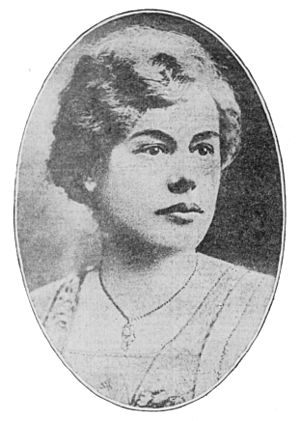Helen Dean King facts for kids
Quick facts for kids
Helen Dean King
|
|
|---|---|
 |
|
| Born | September 27, 1869 Owego, New York
|
| Died | March 7, 1955 Philadelphia, Pennsylvania
|
| Nationality | American |
| Alma mater | Vassar College Bryn Mawr College |
| Occupation | Biologist |
Helen Dean King (born September 27, 1869 – died March 7, 1955) was an American biologist. She was famous for her work with the Wistar lab rat. This special type of rat was bred to be genetically very similar. Scientists used these rats for important studies in biology and medicine.
Contents
Early Life and Education
Helen Dean King was born in Owego, New York. She went to Vassar College and finished her studies there in 1892. Later, in 1899, she earned her highest degree, a doctorate in philosophy, from Bryn Mawr College. Her main project was guided by Thomas Hunt Morgan, a scientist who studied how living things develop and how traits are passed down. Helen focused on morphology, which is the study of the shapes and structures of living things.
Her Career in Science
After college, Helen King stayed at Bryn Mawr College as a helper and student in biology until 1904. She then taught physiology (the study of how living things work) at Miss Baldwin's School in Bryn Mawr from 1899 to 1907.
From 1906 to 1908, she was a research helper at the University of Pennsylvania. She also worked as an assistant in anatomy (the study of body structures) from 1908 to 1909.
Working at Wistar Institute
In 1909, Helen King joined the Wistar Institute, a famous research center. She worked there for over 40 years! She started as an assistant and eventually became a professor of embryology in 1927. She stayed at Wistar until she retired in 1949.
She also helped out at Woods Hole, Massachusetts. A big part of her research looked into how the sex of an animal is decided.
Helen King was also a leader in the scientific community. She was the vice president of the American Society of Zoologists in 1937. She also helped edit scientific journals and managed a bibliography service for the Wistar Institute.
The Wistar Rat Project
One of Helen King's most important contributions was her involvement in creating the Wistar rat. This was a special type of albino rat that was bred to be genetically very similar. This made them perfect for biological and medical research because scientists could be sure that any differences in their experiments were due to what they were testing, not differences between the rats themselves.
Helen Dean King passed away in Philadelphia, Pennsylvania, on March 7, 1955, when she was 85 years old.
Important Research
Helen King's scientific work mostly focused on studying rats that were bred to be very similar. She was especially interested in understanding human health issues by carefully studying these laboratory rats. Because her rats were bred to be almost identical genetically, it made her research much easier and more reliable. Later in her career, she started to focus on studying gray Norway rats.
Awards and Recognition
- Ellen Richards Research Prize of the Association to Aid Scientific Research for Women (1932)
Images for kids
See also
 In Spanish: Helen Dean King para niños
In Spanish: Helen Dean King para niños
 | Bessie Coleman |
 | Spann Watson |
 | Jill E. Brown |
 | Sherman W. White |


